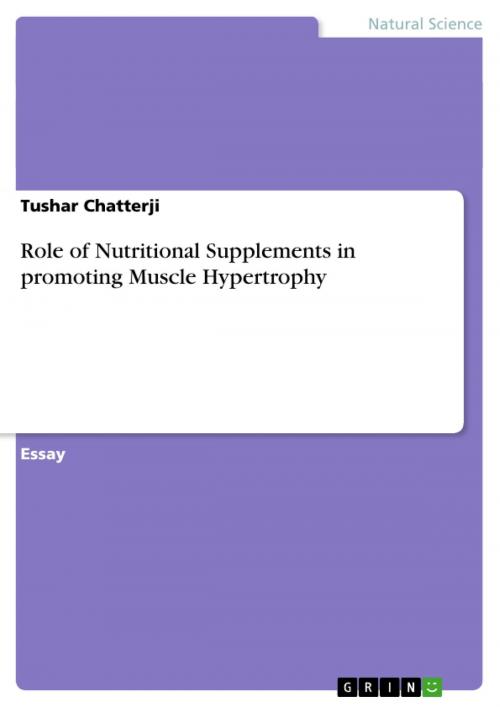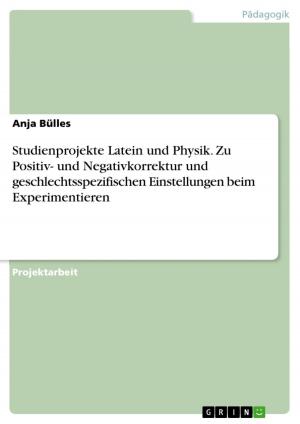Role of Nutritional Supplements in promoting Muscle Hypertrophy
Nonfiction, Science & Nature, Science, Biological Sciences, Cytology| Author: | Tushar Chatterji | ISBN: | 9783656149811 |
| Publisher: | GRIN Verlag | Publication: | March 12, 2012 |
| Imprint: | GRIN Verlag | Language: | English |
| Author: | Tushar Chatterji |
| ISBN: | 9783656149811 |
| Publisher: | GRIN Verlag |
| Publication: | March 12, 2012 |
| Imprint: | GRIN Verlag |
| Language: | English |
Essay from the year 2011 in the subject Biology - Cytology, grade: C, University of Glasgow (Institute of Cardiovascular and Medical Sciences), course: MRes Biomedical Sciences, language: English, abstract: The skeletal muscle is an integral part of our system. It not only acts as the storage reservoir of amino acids, but also serves as the site for protein synthesis and protein breakdown [36]. The rate of protein synthesis needs to exceed protein degradation to achieve muscle hypertrophy [18, 24]. The timing of protein intake, type and quantity play a significant role in achieving optimal outcomes when applied to resistance exercise [36]. Research has been going on since the past decade demonstrating the role of nutritional supplements like whey protein, soy, branched-chain amino acids (BCAAs, especially leucine) and creatine on protein synthesis before, during and after a bout of resistance exercise through careful investigations into intracellular signalling pathways like the mammalian target of rapamycin (mTOR) and its downstream targets-ribosomal protein S6 (kinase-1) and 4E binding protein (4E-BP1) [7, 18]. Intracellular signalling, amongst other variables, involves three essential components-abundant ATP in muscle for providing energy, insulin signalling and leucine (figure 1) [36, 37]. mTOR, regarded as the 'key regulator' of translation comprises mTORC1 and mTORC2 [36]. mTORC1 plays a significant role in promoting muscular hypertrophy via phosphorylation of S6K1 and 4E-BP1 which prevent binding of the eukaryotic initiation factor (eIF) 4E to 4E-BP1 allowing a complex formation with eIF4G (eIF4E-eIF4G) thus enhancing protein synthesis [5, 34]. This report highlights how whey proteins and BCAA (leucine) affect muscle protein synthesis via intracellular signalling pathways thereby contributing significant effects on muscular hypertrophy.
Essay from the year 2011 in the subject Biology - Cytology, grade: C, University of Glasgow (Institute of Cardiovascular and Medical Sciences), course: MRes Biomedical Sciences, language: English, abstract: The skeletal muscle is an integral part of our system. It not only acts as the storage reservoir of amino acids, but also serves as the site for protein synthesis and protein breakdown [36]. The rate of protein synthesis needs to exceed protein degradation to achieve muscle hypertrophy [18, 24]. The timing of protein intake, type and quantity play a significant role in achieving optimal outcomes when applied to resistance exercise [36]. Research has been going on since the past decade demonstrating the role of nutritional supplements like whey protein, soy, branched-chain amino acids (BCAAs, especially leucine) and creatine on protein synthesis before, during and after a bout of resistance exercise through careful investigations into intracellular signalling pathways like the mammalian target of rapamycin (mTOR) and its downstream targets-ribosomal protein S6 (kinase-1) and 4E binding protein (4E-BP1) [7, 18]. Intracellular signalling, amongst other variables, involves three essential components-abundant ATP in muscle for providing energy, insulin signalling and leucine (figure 1) [36, 37]. mTOR, regarded as the 'key regulator' of translation comprises mTORC1 and mTORC2 [36]. mTORC1 plays a significant role in promoting muscular hypertrophy via phosphorylation of S6K1 and 4E-BP1 which prevent binding of the eukaryotic initiation factor (eIF) 4E to 4E-BP1 allowing a complex formation with eIF4G (eIF4E-eIF4G) thus enhancing protein synthesis [5, 34]. This report highlights how whey proteins and BCAA (leucine) affect muscle protein synthesis via intracellular signalling pathways thereby contributing significant effects on muscular hypertrophy.















